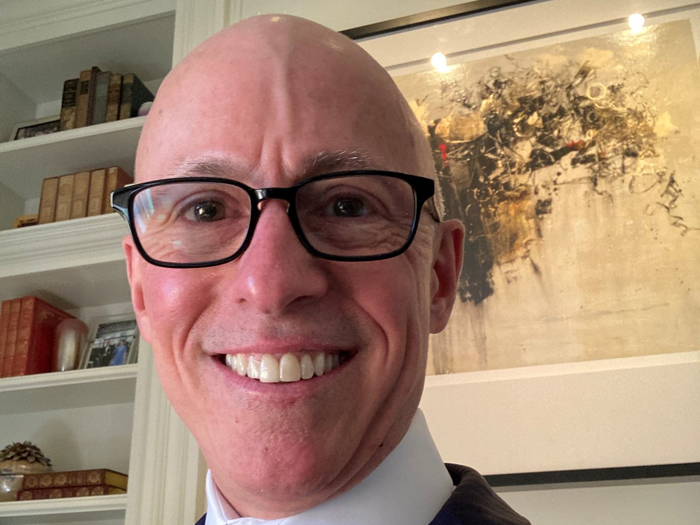Gallagher Bassett’s Bill Bower Shares Insight on Telehealth Liability Claims Industry Trends

Bill Bower, senior vice president and director of health care at Gallagher Bassett (GB) Specialty, began his career as a trial attorney in Chicago before turning his hand to claims, first at CNA, then for Northwestern Medicine in Chicago, before coming to GB Specialty in 2021.
It’s this breadth and depth of experience in law, claims and health care that makes Bower unique and compelling in his current role.
Bower sat down with Risk & Insurance at RIMS 2022 to discuss the future of health care liability claims. In an engaging hour, Bower openly shared his thoughts on the opportunities, trends and challenges facing our industry.
A solutions-focused leader with a thoughtful demeanor, Bower is transparent and listens carefully in conversation. It’s clear as to why he is a success as a people leader and in the courtroom.
Below is a compilation of his insights.
Telehealth Trends and Opportunities
One of the biggest opportunities right now is for providers to have the will and tenacity to jump on board with providing care through telehealth.
Bower pointed out that telehealth services are nothing new, but they gained a new spotlight during the pandemic. Providers had to find new ways to ensure continuity of care during lockdowns. Bower commented that organizations that don’t let the opportunity of telehealth fade will be successful, because it is what patients want.
Bower explained how telehealth is the perfect model for many use cases, especially coming out of the pandemic. Once lockdowns eased, many people were anxious to leave the house and go to places like bars, restaurants or the gym.
Bower astutely observed there wasn’t the same level of excitement for going back to see a doctor in person.
In addition to the need for telehealth services during the pandemic, other use cases include chronic care patients who tend to fall off from treatment, because it is long-term and ongoing. For those chronic care patients, the convenience and efficiency of telehealth appointments can improve their compliance with treatment.
Behavioral health services are another promising application for telehealth services — when a patient is depressed and leaving the house is a challenge, having a virtual appointment could enable the patient to receive care when they otherwise would not.
One new area of focus is the liability aspect of telehealth claims.
Clinicians employing telehealth modalities must know when patients need to transition to in-person services — and this could be a tough call. Having policies and procedures in place can help providers make the right call, but this is a burgeoning area of liability that could stem from the proliferation of telehealth services.
Nuclear Verdicts Pose Tough Challenges
Nuclear verdicts are currently one of the toughest challenges facing health care systems.
With over 100 verdicts exceeding $20 million in the last eight years, nuclear verdicts are becoming more frequent. And it’s becoming harder to predict which cases could go nuclear.
Bower pointed out that often verdicts are not consistent with injuries or damages, so defendants must consider ways to predict and confront issues, including employing new trial tactics. Making the right argument in front of the jury to compel them to consider the actual damages is a challenge.
When talking about the effect of nuclear verdicts on telehealth liability claims, Bower said nuclear verdicts are agnostic as to the mode of care. Whether a service is provided in person or via a telehealth modality is not a factor.
What does make a difference, though, is that nuclear verdicts tend to result from very serious cases — a surgery gone wrong, for example. And those are not the types of health issues usually treated via telehealth.
The more severe medical issues are generally managed in an in-person clinical visit versus a virtual one, so we may continue to see nuclear verdicts result from traditional encounters. This could always change, Bower cautioned, as the use of telehealth expands.
Health Care as a Target for Cyber Crime
Health care is often seen as an easy target for cybercriminals, so hospitals and other institutions get hit often.
And because hospital infrastructure is critical to providing patient care — often a true life-or-death situation — health care institutions often consider paying the demand during a ransomware attack to get their facilities back online so patients don’t suffer.
It is a matter of when, not if, a cybersecurity breach will occur.
Bower recommends a combination approach. Health care providers should develop strong relationships with their underwriters. The market is challenging right now with a lack of capacity and high premiums, but when a breach happens the hospital needs a strong response with first and third-party coverage.
In particular, a first-party cyber policy includes a breach response team made up of counsel, forensics and ransom coverage to help organizations assess and effectively respond to a ransomware incident.
Strong infrastructure and procedures within the health care institution will help the provider get insurance in this harder market. With better controls, breaches are likely to be less frequent and less severe.
Because cyber underwritings are more niche now, businesses that follow the NIST cybersecurity framework and that have strong cybersecurity protocols will fare better when it comes to premiums and coverage limits.
Managing Talent Risk
Attaining and keeping good talent is an issue nationwide, as we continue through the Great Resignation.
Bower looked internally to describe the working environment at GB Specialty, describing a pre-pandemic model of virtual working that lead to a smooth transition to remote work.
And remote working conditions are hugely attractive for people now. Employees want to make a change, and they know they have options.
Bower noted he has seen the Great Resignation impact his team in an inverse way. He has seen young attorneys who get burnt out early in their career and start looking for a change — and they’re looking at risk and claims management. By offering stimulating work in a great environment, insurance can beat back the talent gap and manage talent risk.
Technology Is a Game-Changer in Managing Telehealth Liability Claims
Intelligent automation allows machines to take over mundane, routine tasks and frees human brains to do more critical thinking activities. Machines can replicate the way we behave, taking on rules-based repeatable processes like data entry.
And organizations lose talent because people are over-skilled for tasks that can be performed by a non-human bot.
At the same time, technology and the use of data can enable us to be smarter, better and faster. The more we can use data and engage in intelligent automation, the more efficient we can become.
Inspiration in Intellectual Honesty
Ending our conversation on a motivational note, Bower shared with us what inspires him: “Hard work and intellectual honesty inspire me. I learned long ago I’m rarely the smartest guy in the room, but I can work as hard as anyone. I try to show that to others and I’m inspired by people who work hard.”
“You’ve got to have balance — and intellectual honesty is inspirational to me. It’s true that the harder you work the luckier you are.” &










